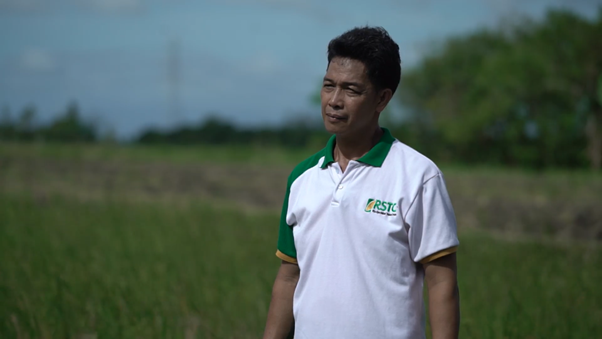January 31, 2023
While his fellow farmers switch to high value crops due to rice’s low yield and market price, Abner Javier continues to plant the country’s staple food believing that rice can reach its potential yield with the right technologies.
He is passionate of this belief that for eight years, the 50-year-old farmer-leader from Calauan, Laguna teaches modern rice farming in his Javier Integrated Farm (JIF) school without charge. With the pandemic and inflation, however, his own funds can no longer accommodate the great number of training requests he received.
The Rice Competitiveness Enhancement Fund (RCEF) Program served as an avenue for him to keep serving and teaching his fellow farmers. What’s more, with the accreditation of JIF through Technical Education and Skills Development Authority (TESDA) as RCEF farmer field school, the program funds the farmers’ training in his learning area.
“The Agricultural Training Institute (ATI) convinced me to enroll in the RCEF Rice Specialists Training Course (RSTC). I joined batch 11 and we graduated early 2022,” Javier said.
RSTC is a season-long training offered under the RCEF Rice Extension Services Program. It aims to develop the technical and decision-making skills in rice and rice-based production of specialists and farmers, and prepare them to serve as resource persons and facilitators during RCEF training programs. The Department of Agriculture-Philippine Rice Research Institute (DA-PhilRice) facilitates the conduct of the course nationwide.
Javier, a farmer for more than three decades, said his farm skills were significantly improved with the re-learning of the basics and introduction of modern farm technologies and practices. The course also gave him more credibility and confidence in training his fellow farmers.
Among his most valuable learnings include the monitoring of friendly insects and the practice of synchronous planting as strategies in managing pests. He also practiced the right timing and amount of fertilizer application.
He applied the knowledge he gained in his 1-ha farm as proof of testimony to his farmer-colleagues.
“For the past two seasons that I applied the learnings, my harvest averages 5-5.5 t/ha. That’s 1-1.5t more before the training,” Javier said.
Through the RCEF scholarship that farmers receive, JIF began receiving enrollees on the production of high-quality inbred rice and seed certification and farm mechanization.
DA-Philippine Center for Postharvest Development and Mechanization (PHilMech) also conducts hands-on training on farm machine operations in Javier’s farm.
Rommel Atayan is one of the farmer-graduates in JIF-led farmer field school and his testimony proves Javier’s belief that increase in rice harvest can be achieved with the right technologies.
“The training provided a platform for us, farmers, to share our challenges and ideas in the field. By learning new technologies and withdrawing from the traditional practices, plus planting the certified seeds I received from the RCEF Seed, my harvest increased from 3.5t/ha to at least 5t/ha,” the 40-year-old farmer shared.
As a passionate agriculture advocate, Javier does not only teach the ways of increasing rice yield. He also encourages them to improve the quality of their harvest.
“I always emphasize during training that a good harvest does not only equate to high yield. The quality of rice is just as important. We should study the market and consumers’ preferences,” he said.
To be successful in farming, Javier added that farmers should strive for quantity and quality.
RCEF was created through Republic Act 11203 or Rice Tariffication Law (RTL), which aims to improve the competitiveness of rice farmers and increase their income through the provision of seed, mechanization, extension, and credit services. The DA-PhilRice, DA-PHilMech, ATI, TESDA, Land Bank, and the Development Bank of the Philippines implement the program’s components. ###

Share this page





